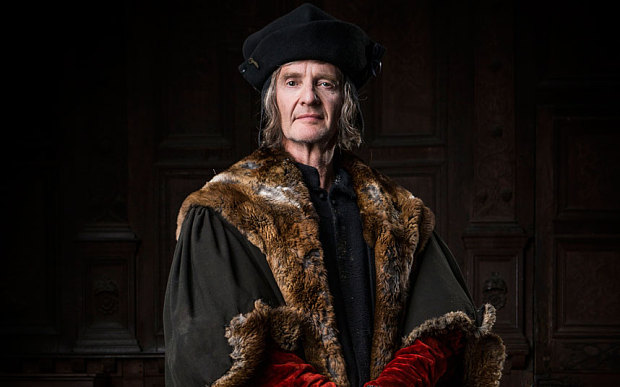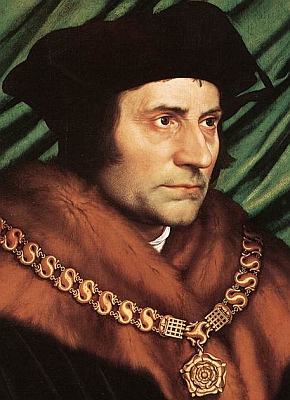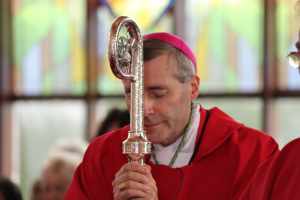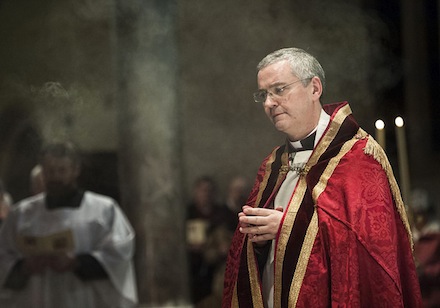
It is disturbing to hear that the currently-popular BBC2 period-drama-series Wolf Hall is depicting St. Thomas More as a creepy, scheming and unloving villain. The series also portrays Thomas Cromwell, in reality a cruel man who had a hand in St. Thomas' execution, as a deeply human and enlightened modern man. As well as being a serious misrepresentation of the historical record, the portrayal based on Hilary Mantel's novels, constitutes a blasphemous mockery of one of God's saints. In an age when the media so thoroughly shapes the thoughts and behaviours of so many people, such an anti-Catholic depiction also threatens to exacerbate the challenges faced by faithful Catholics today. It is itself a form of persecution.
Back in November, we wrote an article about St. Thomas More which included G.K. Chesterton's prophetic reflection on the fact that, whilst More's importance in Chesterton's day was greater than at any time since his martyrdom, it would continue to rise in the century after his lifetime. And so it has proven. In many places today, true marriage and the rights of the Catholic Church are under grave attack; St. Thomas More died defending both of these. It is no coincidence that he is being attacked once again.Â

To counter the flagrant rewriting of any history, it is essential to return to the earliest historical sources. In this context, historian James Monti's 1997 Ignatius Press book The King's Good Servant but God's First - The Life and Writings of St. Thomas More can be very helpful.Â
Whilst acknowledging his unashamed sympathy for More in his introduction, Monti based his account on acknowledged facts, the earliest biographies, More's own correspondence and writings, contemporary artwork and the findings of recent Tudor scholarship. He combined these together with demonstrable interpretations of More's life, actions and works.
The image of St. Thomas More which emerged from Monti's sifting of the evidence was of a deeply religious, and good-humoured family man, whose intimate devotion to Christ, combined with his Renaissance humanism, helped him to live a creative life marked by justice and charity.
We have entitled today's article 'Chancellor No More!' in homage to both St. Thomas and the jester who lived with him. On the day that More ceased to be Chancellor, this wag merrily exclaimed, to laughter at the family breakfast table: ''Chancellor More is Chancellor no more!'' This - and the documentary evidence of More's love for his wife and family - is all a far cry from the BBC's depiction of More as a creepy misogynist who keeps a brain-damaged man imprisoned at home for his own entertainment. The historically cruel Cromwell, on the other hand, is shown as a cuddler of fluffy kittens. This is outright propaganda.Â
Thankfully, two of the English bishops have raised their voices to criticise this unhistorical and anti-Catholic portrayal of St. Thomas More. Â

Bishop Mark Davies of Shrewsbury said: ''We should remember Wolf Hall is a work of fiction. It is an extraordinary and perverse achievement of Hilary Mantel and BBC Drama to make of Thomas Cromwell a flawed hero and of St. Thomas More, one of the greatest Englishmen, a scheming villain.'' His Lordship went on to note how sad it would be if Thomas Cromwell, ''surely one of the most unscrupulous figures in England's history, was to be held-up as a role model for future generations.''
Another bishop who spoke out against this false view of history was Bishop Mark O'Toole of Plymouth Diocese.

Bishop O'Toole, who has had a life-long devotion to St. Thomas More, noted: ''There is an anti-Catholic thread there, there is no doubt about it.''
He explained: ''Hilary Mantel does have this view that being a Catholic is destructive to your humanity. It is not historically accurate and it is not accurate in what the Catholic Faith has to contribute to society and to the common good as a whole.''
His Lordship also noted how the dramatization inverts the qualities of St. Thomas by trying to attribute them to Cromwell. Examples include the fact that, whilst St. Thomas More had a marvellous family life and educated his daughters in Latin and Greek - an uncommon practice at the time - the TV-series suggests that it was Cromwell's family who were educated, whilst More's character comes across as humourless, severe and unloving.
It is good to see these two bishops making a clear stand in defence of the truth. Whilst attacks on the Faith are becoming more pervasive, and therefore dangerous, they can also provide evangelistic opportunities to help people to find the truth. If you know anyone who is watching Wolf Hall, the bishops' words - and books like Monti's - may just help you to unblock the stones from someone's path.
St. Thomas More - Ora Pro Nobis! Â



